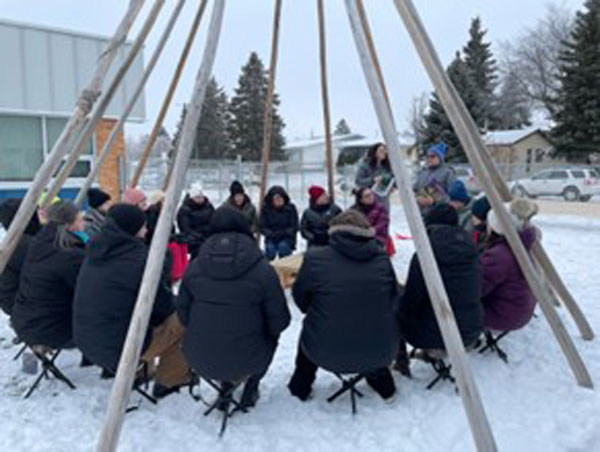
The Saskatchewan Rivers Public School Division Land Based Learning Network is up and running after a successful first meeting at the Prince Albert Wildlife Federation Banquet and Events Centre.
Educators from across the division gathered for the four-part meeting, which included remarks from Elders in attendance followed by presentations on Land Based experience.
Superintendent Jennifer Hingley said the gathering is part of the division’s commitment to reconciliation.
“It is the result of the work with our Elders Council and with our lead teachers, who have really brought to the forefront the importance of land-based learning and the benefits that we get from it,” Hingley said.
“We want to create a common understanding of what is land-based learning for our teachers, for our staff and our students and our community, and that is the reason we pulled all of these people together.”
The day began with a story from Elder Bente Huntley. Educators also heard from Land-Based Learning leader Tanya McCallum about how Land Based Learning can be used to decolonize and Indigenize curriculum, making it more than an option for informal education.
Educators also learned from Tanya Vancoughnett, a Land-Based Learning teacher in the division about the connections Land Based Learning has to food sovereignty and the necessity for connection to land to begin to understand the complexities of food sovereignty for future generations.
She explained that land-based learning is an important piece to work on in the division because from the Indigenous perspective, the land is the greatest teacher.
“It is about acknowledging that we have so much to learn from the land,” Hingley said. “That it’s reclaiming those teachings is really connected to our strategic plan around citizenship.
“We want our young people to feel that connection to the land and that sense of responsibility and relationship to protecting the land, and they can’t do that if they don’t have the experience of being out on the land in a different way.”
Hingley explained that land-based learning teaches about the interconnectedness of air and water and earth. She said it helps build relationships and shows students how to be good neighbours.
“What I do on my land, my little piece of land is going to impact what happens to you and your line,” Hingley said.
“It creates the important experience of working with our elders. It helps us reconnect to our history. We always think about, from an Indigenous perspective, what is the impact of my decision and my actions for the seventh generation from now.”
Hingley explained that land-based learning relates to spirituality, being connected to your responsibility and learning from Elders.
“They (elders) are always thinking about the world that we’re leaving our future generations, but we’re also thinking about t the young people that we’re creating that are living on the Earth now,” Hingley said.
“The key thing that we want our students to learn is that the land is our teacher. It isn’t just something we get stuff from. It’s actually you know something. We have a great responsibility to be good stewards and protectors of the Earth,” she added.
The day also included a Land-Based experience so that educators had an example of the difference between a Land Based learning opportunity and an outdoor education experience
“My takeaway from the day was the idea that Land Based Learning is the cultivation of love of the land. When kids develop a love of the land they have a rooted sense of place, of home. They will work for the land, and they will work with it.” SRPSD Indigenous Perspectives Coach Shea Pilon said in a school division press release.
This work comes on the heels of Saskatchewan Rivers hosting a Saskatchewan Regional Gathering of the Canadian Playful Schools Network in January. Trista Hollweck and Andy Hargreaves, who led the network, were so impressed with the work happening in SRPSD they invited the division to host the gathering. Hollweck was in attendance to work with and learn from our teachers who she says are leading the way in experiential play-based learning.
“Experiential Play-Based Learning and Land Based Learning are connected in that they are both student focused, hands on, and exploration. Land Based Learning has always been a key component of our model and is a critical component to actualize reconciliation and decolonize education,” SRPSD Experiential Play-Based Learning Coach Kami Karakochuk said in a release.
Educators were encouraged to have rich conversations with the guidance of Elders Bente Huntley, Leo Omani, Liz Settee, Sonny Vandale, and Phyllis Vermette.
The next step is for the Indigenous Perspectives Team at the division to consolidate the information from these conversations and feedback from the event to develop a draft framework of practice so that Land-Based Learning can be a part of all Saskatchewan Rivers classrooms in a meaningful way.
“The idea of inclusion, cultural responsiveness, mental health and well-being, learning governance and leadership, it hits on all parts of our strategic plan,” Hingley said.
michael.oleksyn@paherald.sk.ca

